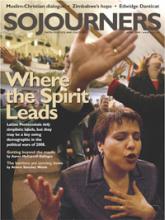In January 4, 2007, former Reagan administration officials George Shultz and Henry Kissinger joined Democrats William Perry and Sam Nunn in publishing “A World Free of Nuclear Weapons” in TheWall Street Journal. A year later, this past January 15, the co-authors expanded on their original proposal in a second op-ed, “Toward a Nuclear-Free World.” The two titles describe a bold vision that must be worked toward with concrete actions.
The authors’ logic is simple: If we cling to our own nuclear weapons in contravention of our treaty obligations, we will not be able to prevent global proliferation and an undeterrable terrorist bomb. The only choice now is to lead the world toward the prohibition and verifiable elimination of all nuclear arsenals and bomb material.
No, really. Kissinger said that.
But this isn’t as surprising if you know the history of the 1986 Reykjavik summit, when Ronald Reagan proposed to Mikhail Gorbachev that they work together to abolish nuclear weapons. Reagan even suggested a victory party at which he and Gorbachev would return to Iceland in 10 years with the last two nuclear missiles, dismantle them, and “have a tremendous party for the whole world.”
That dream was scuttled by differences over missile defense. But on the 20th anniversary of Reykjavik, Reagan’s former staff gathered to consider the nuclear danger anew. The consensus document of that conference, endorsed by 16 top foreign policy officials from the Reagan administration, became the first Wall Street Journal op-ed.
The co-authors now have catalyzed a quiet effort to develop nuclear weapon abolition as a serious policy option. And more than two-thirds of the 24 living former national security advisers and secretaries of state and defense—from both parties—have given their general support to the project.
Read the Full Article
